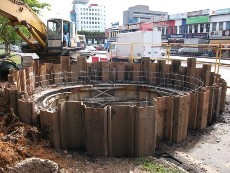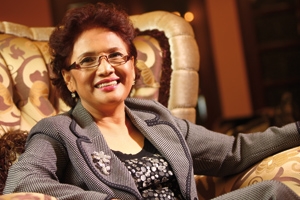 It has emerged that Abdul Taib Mahmud and his family have conducted a massive raid on the public funding for Kuching’s new sewerage system.
It has emerged that Abdul Taib Mahmud and his family have conducted a massive raid on the public funding for Kuching’s new sewerage system.
Figures show that out of a total 530 million ringgit handed out from taxpayers’ money to pay for the project, a staggering 78 million ringgit has been siphoned off by the Taib family and a crony company called Nishimatsu Construction (Nishimatsu’s parent company is currently being prosecuted in Japan in connection with a massive bribery and corruption scandal).
The theft is just the latest example of the so-called ‘skimming’ of publicly funded projects by using bogus sub-contracts, which has become a standard form of abuse in Sarawak under Taib. Critics have condemned it as the crudest possible form of corruption.
“Even a child could understand what is going on”, complained one outraged opposition figure last week, “the only reason Taib gets away with it is because he would sack any newspaper editor who dared to print what is going on. If the people knew the extent of it, the billions he has stolen in this way, they would be marching in fury!”.
Skimming using bogus sub-contracting is now standard practice in Sarawak
The method of theft is indeed astonishingly simple and the Chief Minister, Abdul Taib Mahmud, has made it common practice during his thirty years rule over the State of Sarawak. First he abuses his position of power by placing a project in the hands of a company run by an unqualified member of his own family or a friend. Then the crony sub-contracts the project to another company that is capable of doing the job, but for far less than the original amount. This way the Taibs pocket the difference.

In the case of the Kuching Sewerage System, therefore, it came as little surprise to insiders when it was announced on 30th September 2008that the Chief Minister had awarded the 530 million ringgit contract to a consortium of three companies that included Kumpulan Construction, which is run by his sister, Raziah Mahmud. She and Taib’s brother Onn own 87.5% of the shares in the company.
So what does Raziah Mahmud know about building a public sewerage system?
Kumpulan construction reportedly has no construction equipment and Raziah Mahmud is not qualified to build a modern sewerage system. In fact, her meteoric ‘business career’ developed shortly after Taib Mahmud became Chief Minister, when numerous public contracts started coming the way of companies suddenly started up by herself and other Taib family members.
Onlookers point out that  Raziah Mahmud has only developed one area of evident expertise, which is her ability to rapidly sub-contract projects which have been handed to her by her brother. Thus, on 21st October 2008, less than a month after the original government contract was awarded to the consortium of Kumpulan Construction, Nishimatsu Construction and Hock Seng Lee Bhd (HSL) it was further announced by HSL that the project had now been sub-contracted to them alone, but at the much reduced sum of 452 Million Ringgit. This leaves 78 million ringgit unaccounted for in the hands of the other two companies, Kumpulan and Nishimatsu.
Raziah Mahmud has only developed one area of evident expertise, which is her ability to rapidly sub-contract projects which have been handed to her by her brother. Thus, on 21st October 2008, less than a month after the original government contract was awarded to the consortium of Kumpulan Construction, Nishimatsu Construction and Hock Seng Lee Bhd (HSL) it was further announced by HSL that the project had now been sub-contracted to them alone, but at the much reduced sum of 452 Million Ringgit. This leaves 78 million ringgit unaccounted for in the hands of the other two companies, Kumpulan and Nishimatsu.
Unsavoury business partner?

Sarawak Report would therefore like to know how the missing 78 million ringgit was divided between Raziah Mahmud and the Japanese-owned Nishimatsu Construction Co?
Nishimatsu Construction hit the headlines last year when the Japanese authorities arrested its Chairman for operating a I billion Yen slush fund, which he admitted he had used to make bribes to gain foreign contracts and to make illegal political donations. The scandal forced the resignation of the Japanese opposition leader Ichiro Ozawa.
Therefore, it is only fair to demand a clear explanation of the relationship between Nishimatsu and the Taib family and to ask what work could have been carried out by Kumpulan/Nishamatsu during this three week period that could have merited a payment of what is around US $25 million?
If such enquiries have brought a top political resignation in Japan, what might a proper investigation produce in Sarawak?
Taibs’ long-standing ties with Nishimatsu

Our researches have further shown that the Kuching Sewerage project is just one of several large-scale public construction projects that have been handed in much the same way to the same consortium of Kumpulan Construction, Nishimatsu Construction and HSL.
Since Raziah’s take-over of Kumpulan in June 1986 (up to which point it was a dormant company) the projects awarded to the same three companies have included the 40,000 seat outdoor stadium at Petra Jaya worth RM105 million and The Senari Deepsea Port valued at RM160 million.
Unfortunately for the public purse however, the level of profit that Kumpulan has been able to register from these major ventures has been minimal, according to figures obtained from the Register of Companies. For example, in 1991 a turnover of MR8.5 million produced only MR 249,474 in profits and in 1991 a turnover of MR 5,811,443 produced profits of just MR 23,451. In fact for five of the years between 1986 and 1998 the company actually registered a loss for tax purposes.
How much went to Taib himself?
Given that Sarawak Report has now established that Taib family members operate a system of secretly holding shares in their companies in trust for the Chief Minister (see Unmasked – Taib the Godfather, Sarawak Report), the people of Sarawak can assume that in fact a large chunk of the money skimmed off from the sewerage project has gone straight into Taib’s own foreign bank accounts.

The vast ‘cut’ taken by the Chief Minister’s family for this project means that either the people of Sarawak have paid MR 78 million too much for the job in the first place, or that the contract is now short of money and will be inadequately carried out.
Worringly, the most likely answer is a combination of both, meaning the people of Kuching have paid too much money for a sub-standard sewerage system purely in order to further enrich the Taib family.
Reform of the system could immediately be carried out by returning to the conventional system of open tendering for public contracts, which is the globally-accepted method of preventing fraud of this nature and is supported by the main opposition parties in Sarawak.
